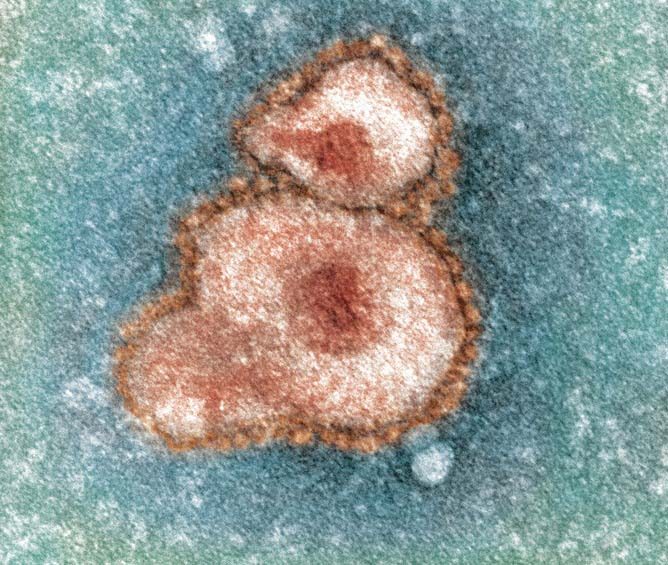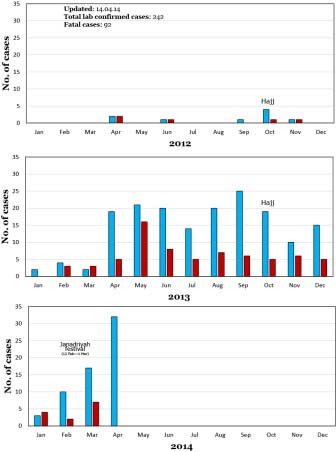
With reporting from Ankita Menon
Though incidences of the Middle East Respiratory Syndrome (MERS) are spreading across Saudi Arabia, the UAE and Yemen, Qatar has remained free of the virus for several months, a senior health official has said.
Speaking to Doha News, Dr. Mohammed Al Hajri, Director of Health Protection and Communicable Diseases Control at the Supreme Council of Health, said that he had heard about the recent outbreak of the virus in the Gulf, but that Qatar has thus far remain untouched by it.
Six paramedics in the UAE were diagnosed with MERS last week, with one man succumbing to the respiratory virus. The other five remain in quarantine.
Saudi Arabia meanwhile has confirmed that 15 people have been infected with MERS this month, according to the World Health Organization. On Twitter, WHO said:
13 April #MERS update: 12 cases, incl 1 death are reported from Jeddah, 3 cases incl 1 death are reported in Riyadh
— World Health Organization (WHO) (@WHO) April 13, 2014
13 April #MERS update: In addition to the 15 new lab-confirmed cases Saudi Arabia notified death of the 26 year-old male reported on 2 April
— World Health Organization (WHO) (@WHO) April 13, 2014
Also this week, nearby Yemen reported its first case of MERS on Sunday – a Yemeni national who works as an engineer.
Efforts criticized
The MERS virus was first discovered in September 2012. Since then, WHO said it was aware of 228 confirmed cases of the illness, including 92 deaths.
The vast majority of people affected are in Saudi, where some 189 people have been diagnosed with MERS, and 68 people have died from the illness.
According to the Wall Street Journal, the Kingdom is drawing criticism for its handling of the virus. The newspaper reports:
“I’m not pretty sure that they are actually seeing how big this thing is,” a Saudi doctor said on Sunday at King Fahd General Hospital, the large public hospital in Jeddah that has been hardest hit by a spike in the city this month.
The hospital reopened its emergency room on Friday after shutting it briefly for what authorities said was disinfection measures against MERS. But patients were avoiding the hospital, and health workers were “very worried” after the MERS death of one colleague and sickness in another, the doctor said. “What I really wish for is to shut the whole hospital down” until the spread subsides, she said.

Also quoted in the WSJ is Australian virologist Dr. Ian M. Mackay, who has been blogging about MERS.
On his website, Mackay said that this month marks the highest number of reported cases since the virus was discovered in 2012.
He also points out that 50 of people infected with MERS so far are healthcare workers, and that the number is rising.
More about MERS
Scientists are still working to figure out a cure to MERS, which presents as a severe respiratory virus with coughing, fever and difficulty breathing.
Last month, Qatar announced that it had helped successfully culture MERS in a laboratory, a first step to figuring out how to prevent and control the virus, and develop vaccines and other treatments for it.
At the time, Netherlands-based Erasmus Medical Center (EMC), which also worked on the culturing, said the virus was isolated after taking a swab from a camel here. Scientists were working to see if that virus was the same one making humans sick, EMC virologist Dr. Bart L. Haagmans added.
So far, eight people inside of Qatar have been diagnosed with MERS, and four of those patients have died. Additionally, a Qatari man diagnosed in 2012 in the UK died in London last July. There have been no new cases here since November.
To reduce the risk of infection, the SCH has advised people with chronic diseases or who are immuno-compromised to avoid close contact with farm animals.
Anyone with questions or symptoms can call the SCH’s dedicated MERS hotline: +974-6674 0951.
Thoughts?







